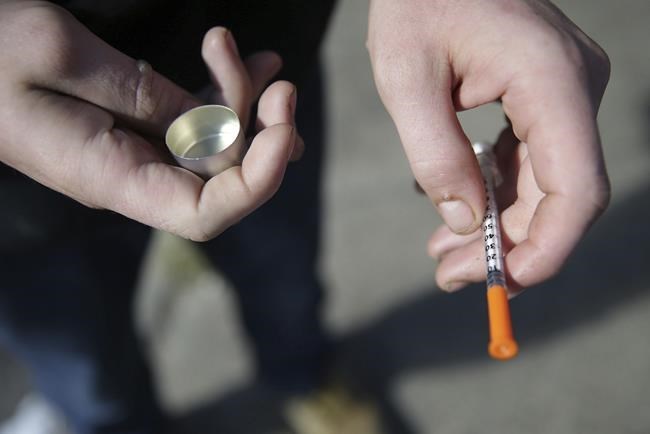TORONTO — A spike in suspected fatal opioid overdoses in Toronto prompted the city to issue a warning to drug users this week, with harm reduction advocates saying the "heart-wrenching" situation highlighted the need for decriminalization and a widespread regulated supply
Toronto Public Health issued an alert Wednesday, citing the rise in suspected opioid deaths and a reported increase in the potency of the illicit fentanyl supply.Â
The alert said paramedics had responded to at least 15 suspected fatal overdose calls over the past four weeks. It said they received at least five calls within four-day spans on three separate occasions.
Toronto's medical officer of health Dr. Eileen de Villa said the latest string of suspected overdoses was "higher than the historical average."Â
"Hence our concern, and our interest in making sure that people who use drugs, and the people who served them are aware of this and can take action to protect the health of people who use drugs in our community," she said in an interview Thursday.Â
Harm reduction advocates said that without urgently needed changes, the alerts will continue.
"People keep dying. We see these numbers, and these are human beings," said Rhiannon Thomas, program co-ordinator for COUNTERfit, a women's harm reduction program at Toronto's South Riverdale Community Health Centre.Â
"There are two ways I would describe it: absolutely, devastatingly heart-wrenching ... and also absolutely enraging."Â
It was the first drug alert Toronto Public Health officials issued since July, when paramedics responded to 10 overdose deaths in a five-day span.
With the latest alert, Toronto Public Health said a number of drugs were involved and overdoses took place in neighbourhoods across the city. It did not immediately respond to requests Thursday to provide up-to-date data on calls for suspected fatal overdoses in the city.
Publicly available data dates back to the end of September, when paramedics responded to 18 fatal overdose calls.Â
Toronto's Drug Checking Service, a Health-Canada backed project that tests illicit drugs from across the city, found some fentanyl samples last week that were about three times more potent than usual, though it cautioned the numbers came from a small sample size.Â
Project Manager Hayley Thompson said the amount of fentanyl detected in a sample is typically about four per cent, but samples tested last week showed that number jumped to 14 per cent.
"It's significantly stronger than what we typically see," she said.
Samples collected in the downtown core, in particular, returned much higher concentrations of fentanyl than usual, she said.
Those fentanyl samples also regularly turn up benzodiazepines, a class of drug often used as a sedative or tranquilizer, which when taken with opioids can build dependency and up the risk of overdose, Thompson said.Â
"With the volatility of the supply currently, I just think there's never been a better case for making a regulated supply more available," Thompson said.
Harm reduction advocates have long pushed governments to offer widespread, low-barrier access to a regulated, pharmaceutical-grade supply of drugs.Â
While a select number of Toronto health centres offer prescribed opioids to those with severe dependencies, advocates say referrals are hard to come by and application criteria are too narrow.Â
"It's not good enough," said Thomas, the COUNTERfit program coordinator. "You have to change the legislation, change the laws, and then we can do a lot more work."
It has been 10 months since Toronto Public Health submitted a preliminary request asking the federal government to decriminalize the possession of illicit drugs for personal use in the city, three months longer than it took for a similar request in British Columbia to get approved.Â
Toronto's top doctor said Thursday the city's request has yet to be finalized.Â
"We want to make sure that when we submit that we're putting in something that is going to be successful. So that does take time. But that doesn't mean that we're not concerned, we're actively working on this," de Villa said.Â
Toronto laid out a model as part of that request that supports expanded safer supply programs and increased access to social supports, including housing.Â
More than 1,000 people died from overdoses in Toronto in 2020 and 2021, nearly double the number of reported deaths in the previous two years.Â
This report by The Canadian Press was first published Nov. 17, 2022.Â
Jordan Omstead, The Canadian Press

